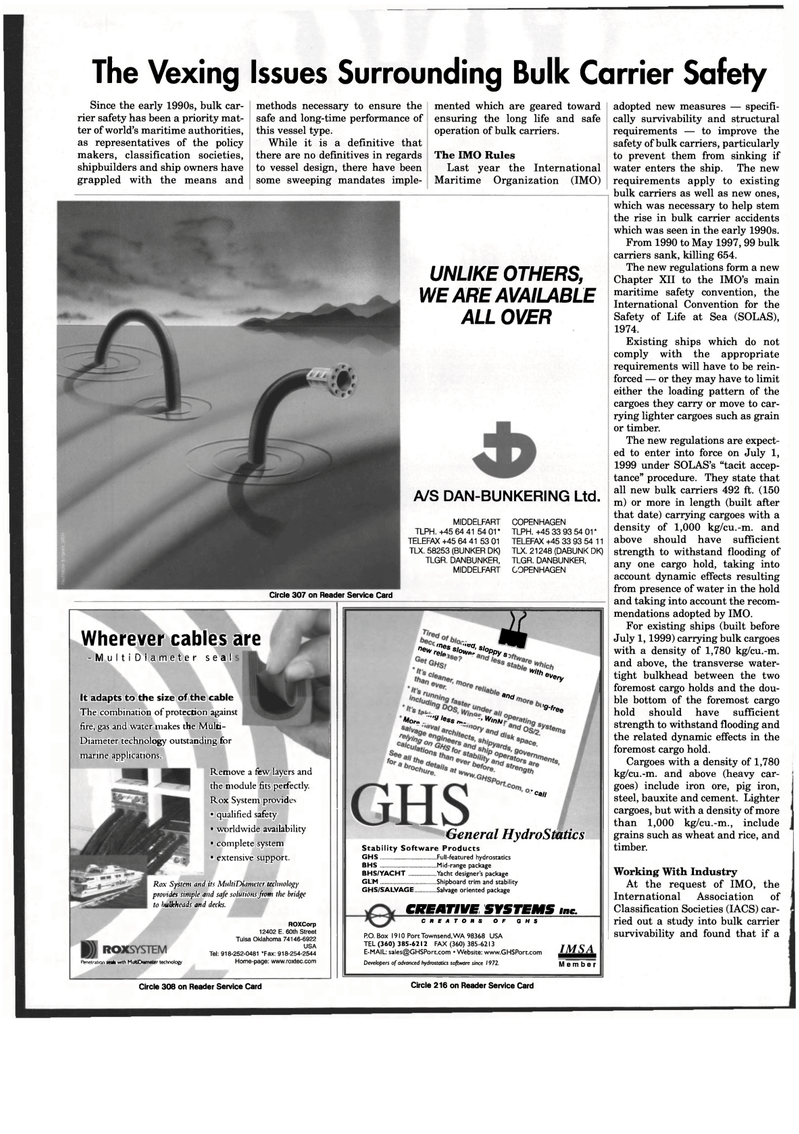
Page 56: of Maritime Reporter Magazine (February 1998)
Read this page in Pdf, Flash or Html5 edition of February 1998 Maritime Reporter Magazine
The Vexing Issues Surrounding Bulk Carrier Safety
Since the early 1990s, bulk car- rier safety has been a priority mat- ter of world's maritime authorities, as representatives of the policy makers, classification societies, shipbuilders and ship owners have grappled with the means and methods necessary to ensure the safe and long-time performance of this vessel type.
While it is a definitive that there are no definitives in regards to vessel design, there have been some sweeping mandates imple- mented which are geared toward ensuring the long life and safe operation of bulk carriers.
The IMO Rules
Last year the International
Maritime Organization (IMO)
UNLIKE OTHERS,
WE ARE AVAILABLE
ALL OVER
A/S DAN-BUNKERING Ltd.
MIDDELFART COPENHAGEN
TLPH. +45 64 41 54 01 * TLPH. +45 33 93 54 01 *
TELEFAX +45 64 41 53 01 TELEFAX +45 33 93 54 11
TLX. 58253 (BUNKER DK) TLX. 21248 (DABUNK DK)
TLGR. DANBUNKER, TLGR. DANBUNKER,
MIDDELFART COPENHAGEN
Wherever cables are -Multi Diameter seal
It adapts to the size of the cable
The combination of protection against fire, gas and water makes the Multi-
Diameter technology outstanding for marine applications.
Remove a few layers and the module fits perfectly.
Rox System provides • qualified safety • worldwide availability • complete system • extensive support.
Penetratiqp seals with MultiDtafneter technology
Rox System and its MnltiDiameter technology provides simple and safe solutions from the bridge to bulkheads and decks. 9
ROXCorp 12402 E. 60th Street
Tulsa Oklahoma 74146-6922
USA
Tel: 918-252-0481 *Fax: 918-254-2544
Home-page: www.roxtec.com ~s n°»r7 p
Ss>oZ-S'°Ppy s
With BV
0l Hor. . 9 /eSS n,- ' W'nN
'9-free
'can
General HydroStatics
Stability Software Products
GHS Full-featured hydrostatics
BHS Mid-range package
BHS/YACHT Yacht designer's package
GLM Shipboard trim and stability
GHS/SALVAGE Salvage oriented package
CREATIVE SYSTEMS inc.
CREATORS OF 0 H S
P.O.Box I9I0 PortTownsend.WA 98368 USA
TEL (360) 385-6212 FAX (360) 385-6213 T A/I C A
E-MAIL: [email protected] • Website: www.GHSPort.com ^^^^^
Developers of advanced hydrostatics software since 1972. Member
adopted new measures — specifi-
cally survivability and structural
requirements — to improve the
safety of bulk carriers, particularly
to prevent them from sinking if
water enters the ship. The new
requirements apply to existing
bulk carriers as well as new ones,
which was necessary to help stem
the rise in bulk carrier accidents
which was seen in the early 1990s.
From 1990 to May 1997, 99 bulk
carriers sank, killing 654.
The new regulations form a new
Chapter XII to the IMO's main
maritime safety convention, the
International Convention for the
Safety of Life at Sea (SOLAS),
1974.
Existing ships which do not
comply with the appropriate
requirements will have to be rein-
forced — or they may have to limit
either the loading pattern of the
cargoes they carry or move to car-
rying lighter cargoes such as grain
or timber.
The new regulations are expect-
ed to enter into force on July 1,
1999 under SOLAS's "tacit accep-
tance" procedure. They state that
all new bulk carriers 492 ft. (150
m) or more in length (built after
that date) carrying cargoes with a
density of 1,000 kg/cu.-m. and
above should have sufficient
strength to withstand flooding of
any one cargo hold, taking into
account dynamic effects resulting
from presence of water in the hold
and taking into account the recom-
mendations adopted by IMO.
For existing ships (built before
July 1,1999) carrying bulk cargoes
with a density of 1,780 kg/cu.-m.
and above, the transverse water-
tight bulkhead between the two
foremost cargo holds and the dou-
ble bottom of the foremost cargo
hold should have sufficient
strength to withstand flooding and
the related dynamic effects in the
foremost cargo hold.
Cargoes with a density of 1,780
kg/cu.-m. and above (heavy car-
goes) include iron ore, pig iron,
steel, bauxite and cement. Lighter
cargoes, but with a density of more
than 1,000 kg/cu.-m., include
grains such as wheat and rice, and
timber.
Working With Industry
At the request of IMO, the
International Association of
Classification Societies (IACS) car-
ried out a study into bulk carrier
survivability and found that if a
Circle 308 on Reader Service Card Circle 216 on Reader Service Card
Circle 307 on Reader Service Card

 55
55

 57
57
